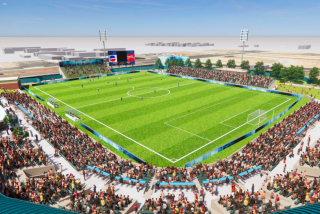NFL Owner Might Have Designs on Manchester
The news out of England Monday that Malcolm Glazer, the billionaire owner of the NFL’s Tampa Bay Buccaneers, is the man behind a $1.2-billion takeover attempt at Manchester United surely did not sit well in Zurich.
It was only a few days ago that Switzerland’s Joseph “Sepp” Blatter, FIFA’s president, was bemoaning that “greedy” European clubs were moving toward an American business model and warned that such an approach was a “recipe for disaster” as far as international soccer is concerned.
“A few clubs feel strongly that their future ... is a European professional league, governed by themselves, but above all governed by money,” Blatter wrote in a column for London’s Financial Times. “The result would be a situation in which Europe adopted the American concept of the NFL or the NBA in which money rules and social conscience is of limited relevance.”
Blatter might not have had Glazer specifically in mind when he said that soccer “must not become the plaything of a greedy few who believe that their financial strength gives them the legitimacy to call the shots,” but Manchester United fans will back the FIFA president on this particular crusade.
Six years ago, the fans successfully rebuffed an attempt by Rupert Murdoch to take over the club.
“If Glazer wants a fight, we’ll give him one,” Jules Spencer, of the Independent Manchester United Supporters’ Assn., told England’s Guardian newspaper. “We want to make it clear that he is not welcome or wanted as owner of Manchester United.”
Glazer, 75, has been gradually increasing the number of shares he owns in the club and now holds a 19.2% stake in the team. Manchester United confirmed Monday that it “has received a preliminary approach regarding a possible offer” for the club but said that the offer “contains a number of significant conditions.”
Although Glazer declined to comment, Reuters quoted unnamed sources as saying that he is the suitor.
If successful, Glazer would not be the first American to own a Premier League team. Portsmouth is owned by San Jose businessman Milan Mandaric. But Manchester United, along with Arsenal, Chelsea and Liverpool, is one of England’s big four, the clubs whose financial clout and unwillingness to kowtow to FIFA whims so concern Blatter.
In the last month, all four have shown just how wealthy and powerful they are, on and off the field. For instance:
* United paid Everton $48.9 million to acquire 18-year-old England striker Wayne Rooney, who promptly repaid them with a hat trick in his debut for the club last week in the European Champions League, a feat that caused his jersey from that game to be valued at $18,000.
* Arsenal, the defending champion, has extended its unbeaten run in Premier League play to a remarkable 48 games. The club is wealthy enough to recently have rejected a reported $36-million bid for French midfielder Patrick Vieira and it moves into a new $634-million, 60,000-seat stadium for the 2006-07 season.
* Chelsea, whose Russian billionaire owner, Roman Abramovich, has spent more than $378 million on players since taking over the club 15 months ago, last week announced that it will build a multimillion-dollar training facility with 15 fields and a youth academy to open in 2006.
* Liverpool, whose 18 English and four European championships put it far ahead of any other English club, last week received local government approval to build a 60,000-seat stadium just down the road from its home in Anfield. It also will open in 2006.
And as Manchester United weighs Glazer’s offer, Liverpool, too, is considering a bid from the United States.
Hollywood film producer and Liverpool native Mike Jefferies of Milkshake Films in Santa Monica, along with former Miramax Films executive Stuart Ford, last month began talks to invest as much as $179 million in the club to help it keep pace with the other three.
Add into the equation Europe’s other leading clubs, many of them with gleaming new stadiums and all of them acting as a magnet for the world’s top players, and it is obvious why Blatter is worried.
Europe’s top clubs could very well go their own way if relations with FIFA deteriorate further.
Blatter and his FIFA cohorts should be mending fences, not erecting barricades. After all, the success of European clubs and their willingness to scour the world for talent has enriched the national teams of the countries from which those players come.
Many countries are better off because their best players play in Europe. Arsenal Coach Arsene Wenger and former U.S. national team coach Bora Milutinovic made that point this summer.
“It’s an irony that the bigger countries with more money improve the players of smaller countries with less money, so in the national teams it comes back to haunt them,” Wenger said of all the upsets that occurred at the European Championship in Portugal.
“The fact that many Asian players are now playing in European league clubs means that they are getting invaluable experience for the future,” Milutinovic said at the Asian Championship in China. “All this has contributed to improved performance on the international level.”
With so much money in the game today, it is small wonder that American investors finally are recognizing its potential. Blatter should consider this: Glazer is one of 313 U.S. billionaires, according to Forbes magazine.






